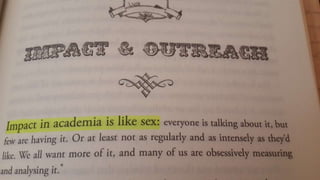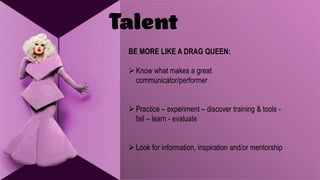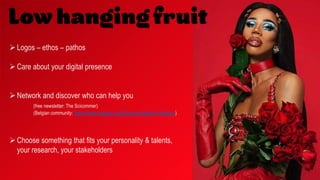Category is...science communication!
- 1. Esther De Smet - Postdoc Community Event 16 December 2021
- 3. Why engage in science communication? Open Science Fake news Pathway to impact Professional and personal development
- 4. Curiosity Solving puzzles Enjoying experiments Creativity Fascination for nature Fascination for culture Love of teaching Love of learning Love of freedom Do good Have an impact Change the world Leave a mark Fix injustice Karma
- 6. Two things to mind: Stakeholders / publics Story(telling)
- 7. Two things to mind: Stakeholders beneficiaries / casualities collaborators decision makers
- 10. Story(telling)
- 13. Just remember: attention & reach is not IMPACT but it does take…
- 16. Five key points of being a good communicator, Nancy Baron (2010) Show your passion Power of being personal Right & well-told story Be a leader Community of support
- 17. BE MORE LIKE A DRAG QUEEN: Know what makes a great communicator/performer Practice – experiment – discover training & tools - fail – learn - evaluate Look for information, inspiration and/or mentorship
- 18. Logos – ethos – pathos Care about your digital presence Network and discover who can help you (free newsletter: The Scicommer) (Belgian community: https://www.meetup.com/Scicomm-Belgium-Meetup/) Choose something that fits your personality & talents, your research, your stakeholders
- 20. @ResearchUGent THANK YOU FOR LISTENING! And thank you, RuPaul, for the inspiration and visuals… If you only read one article, read this one: http://www.facetsjournal.com/article/facets-2016- 0055/ Esther De Smet Research Department December 2021
Editor's Notes
- Fontmeme - orangina




















